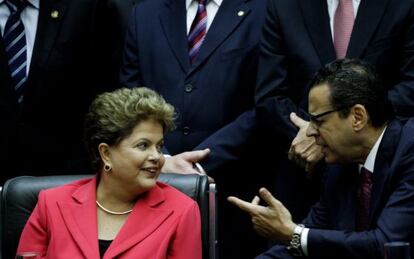Two hopefuls for Brazil's presidency face off in first duel
President Dilma Rouseff and the ecologist Marina Silva stage a preview of next year's presidential campaign season


President Dilma Rousseff and the ecologist Marina Silva, the two candidates at the top of the polls for next year's presidential election, have become embroiled in a dispute over the state of the economy. The ensuing debate has been seen as the starting point of the campaign season.
Since both are convinced that the economy will be a deciding factor in the elections they have started a controversy around the topic. Silva spoke in Recife, on the socialist Eduardo Campos' turf. The environmentalist joined Campos' Brazilian Socialist Party in order to present her candidacy because her own camp, Rede Sustentabilidade, had not yet been officially established. Rousseff answered from Minas Gerais, the backyard of the opposition candidate, Aecio Neves of the Brazilian Social Democracy Party (PSBD).
Silva opened fire at an event sponsored by Credit Suisse Group and closed to the press. After acknowledging that the ex-president of the PSDB, Fernando Henrique Cardoso, as well as the former president of the Labor Party, Lula da Silva, had left "footprints" on the economy she said that Rousseff's legacy is a step backwards in economic policies.
The presidential hopeful accused the sitting government of negligence due to certain "political anxieties." Silva, who has been criticized for prioritizing environmental issues more than other serious challenges the country faces, wanted to make it clear to business leaders that once president she would respect the three pillars that supported economic success and growth: the primary surplus, the fluctuation of the currency and the inflation standards, which she says, are too high.
Rouseff did not keep quiet. Before a group of 400 business leaders she answered her adversary, making it clear that despite "the international crisis" Brazil would continue to "adhere to its inflation standards," which are at 4.5 percent with a margin to go up to 6.5 percent. The president said that the rate "has never exceeded that margin in the last 10 years" and that "our commitment to fiscal discipline has not changed, as is demonstrated by the fact that we have gone through the worst crisis in history since 1929 and yet we have kept our debts under tight control." Then Rouseff added, "our public debt compared to GDP is one of the smallest in the world."
Silva brought out the thorny issue of aid packages from the Brazilian Development Bank, which according to her, are used inappropriately to benefit "a few anointed persons who receive the money." She said the four billion dollars for the businessman Eike Batista had been "practically thrown out." "Imagine if that money had been given to young entrepreneurs, the number of opportunities that we would gain in terms of job creation and new businesses," she continued.
Silva said Rouseff's management has walked the country back in terms of environmental and economy sustainability. Rouseff on the other hand highlighted the fact that her government has worked to "reduce industrial costs" cutting down energy prices and lowering taxes on some products. She said that anyone could become president and that she "did not feel superior" to anybody. She also addressed her adversaries in the upcoming election whom her public image guru, João Santana, has called "cannibalistic dwarfs." All of them, Rouseff said "should study more" and "learn more about the country's problems."
Rouseff told the audience that she was already president and therefore her job was to govern. The rest will come later, she said.
The president also left a few enigmatic statements hanging in the air, including that "no one is in possession of the truth" since "the truth rests with us."
For now it looks like a fight between David and Goliath. Rouseff, who is considered one of the most powerful women in the world, would beat any of her opponents in the second round given her vast popularity. Both are, however, women of strong character and both are internationally recognized figures. Rouseff for having known how to carry the difficult legacy of the charismatic Lula da Silva who finished off his last two years in office with an 85 percent approval rating. Silva is well known for her defense of sustainable economies that create wealth without destroy the planet.
Two women who "make Brazil proud" because of their steadfast defense of freedom in one of the world's largest democracies. Both are former ministers and friends of the only man who would win the presidential election today in the first round: Lula, the guru, who has already announced that he will not be running. Instead, he said he will campaign for Rouseff "as if he himself were the candidate."
Translation: Dyane Jean François
Tu suscripción se está usando en otro dispositivo
¿Quieres añadir otro usuario a tu suscripción?
Si continúas leyendo en este dispositivo, no se podrá leer en el otro.
FlechaTu suscripción se está usando en otro dispositivo y solo puedes acceder a EL PAÍS desde un dispositivo a la vez.
Si quieres compartir tu cuenta, cambia tu suscripción a la modalidad Premium, así podrás añadir otro usuario. Cada uno accederá con su propia cuenta de email, lo que os permitirá personalizar vuestra experiencia en EL PAÍS.
¿Tienes una suscripción de empresa? Accede aquí para contratar más cuentas.
En el caso de no saber quién está usando tu cuenta, te recomendamos cambiar tu contraseña aquí.
Si decides continuar compartiendo tu cuenta, este mensaje se mostrará en tu dispositivo y en el de la otra persona que está usando tu cuenta de forma indefinida, afectando a tu experiencia de lectura. Puedes consultar aquí los términos y condiciones de la suscripción digital.








































